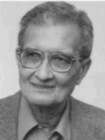 Distinguished economist and philosopher, awarded the Nobel Prize in 1998 for his seminal work in welfare economics
Distinguished economist and philosopher, awarded the Nobel Prize in 1998 for his seminal work in welfare economics
(birth. 1933, Shantiniketan, West Bengal), He has been influential in refurbishing an ethical height to economics and related disciplines.
After completing his early academic education in India (Shantiniketan and Presidency College, Calcutta), Amartya Sen joined the Trinity College, Cambridge, in 1955 to study economics and obtained his doctorate from the university in 1959. He became a professor at the age of 29. In his professional career Sen has contributed to some of the world’s best educational institutes i.e., Delhi School of Economics (1963-71), London School of Economics (1971-77), All Soul’s College, Oxford (1977-88), and Harvard University (1989-97). He was appointed the Master of Trinity College in 1998.
Sen has made important contributions to development theory, planning, capital and growth theory, the study of technology and employment, the theory of social choice, and population policy which has added new dimensions within the discipline of Economics.
Amartya Sen has written numerous books and over 200 articles in scientific journals. Some of his major publications include Choice of Techniques, Collective Choice and Social Welfare (1970), On Economic Equality (1973), and Poverty and Famines (1981). He has co-authored a book with the Belgian economist Jean Dreze, India Economic Development and Social Opportunity (1995).
Sen has presided over important scientific associations including the American Economic Association, the Econometric Society, and the International Economic Association.

